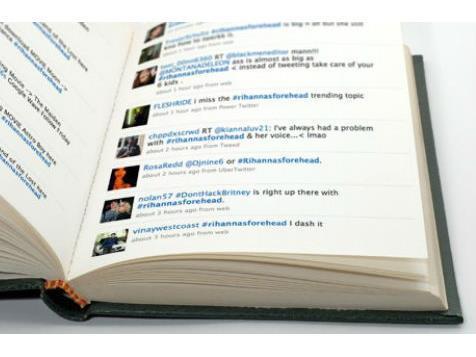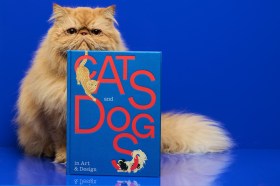Though there’s no official mandate, a writers festival today is almost obliged to consider the impact 140 characters can have on a form that traces its history to Petronius’ Stayricon in 50AD. Technology invariably influences our ingestion of words and is worthy of contemplation, undoubtedly shadowing many of the discussions held in the final throes of Melbourne’s winter.
Scrolling the MWF program on an app or scrunching your way through the tabloid version, one discovers an experience analogous of one of the festival’s main considerations – the relationship between the digital and the traditional, touch-screens and print, Twitter and Tolstoy.
During the last leg of the Edinburgh World Writers Conference (EWWC) that dichotomy was dissected. In The Future of the Novel, American author and Twit Teju Cole traded opinions with trans-media writer Christy Dena over the duality of contemporary writing.
As Cole said in his opening address, discussing the future of the novel is fraught with difficulties. ‘It’s a strange thing to talk about – anything I say is guaranteed to be wrong.’
He was right. Launching his speech with a quote from Brodsky, ‘A great writer is one who elongates the perspective of human sensibility’, Cole gave a brief history of the novel, from Camus through Flaubert, Austen, Steinbeck and Woolf. Paying particular attention to modernist experimentation, Cole drew an incredibly long bow in likening the schizophrenic slogans of Twitter as a possible return to the era’s stream of consciousness and form-defying genius.
It seems these kinds of works, those that ‘elongate the perspective of human sensibility’ via experimentation and high-literary merit, are the only writing worth paying attention to. These are the artistic works that he name-dropped like an eager undergrad on the tweed sleeve of an attractive tutor.
‘I acknowledge the existence of the other kind, the kind that an author can write many of in one year, the kind that the reader hardly remembers reading, the kind that fits neatly into a genre and whose main purpose is to help the reader pass some hours on a plane: the survival or evolution of this more ubiquitous type of novel is not of particular interest to me.’
Not to him maybe, but to any number of publishing industry realists, readers and even the writers derided as hacks who write them, they’re of interest, and their evolution should be considered at least in parallel to Literature. In any event, sparking the recently surrendered battle between Literature and popular novels isn’t particularly helpful in a discussion on the future of the form, especially not in a forum that aims to elate Twitter as an example of some universal consciousness.
To bastardise Cole’s interpretation of a Randall Jarrell quote, the prose of Literature is of some length with something wrong with it, as opposed to the airport novel, which is ‘neat and untroubled’. The opposite seems more easily accepted. There are masterful literary novels out there, and a bunch of shit Dan Brown imitators.
Cole’s refusal to consider the two side-by-side and the distinctions with which he defined them made me think of Raymond Chandler’s The Big Sleep. Would we dismiss a book that Time voted in the 100 best novels of all time because it’s genre? Talk about ‘something wrong’, not even President Roosevelt got an answer on who drowned the chauffer.
But I digress, much like Cole himself may have. This discussion was really about Tweeting and trying to find some artistic parallel with Writing. It seems insane to broach the high/low culture battle in a discussion desperate to screw one of the most pedestrian forms of expression into the deep gorges left by the novel. But a man as smart and eloquent as Cole can surely give it a shot. On Twitter, there are ‘No novelists… but a novel’, and its ‘atomised mode of experimentation is no longer elite’, ensuing that ‘the novelist is smaller, but the novel is getting bigger’.
All pithy observations less than 140 characters, as is another one that Cole later offers: ‘I’m not even sure this cascade of thoughts is a good thing.’ For a man who thinks Tweeting is akin to Writing, and that telling a writer to get off Twitter is like ‘barging into a room at Juilliard and saying get off that cello’, for him to admit the platform is ‘sometimes… almost a horror’ doesn’t bode well for Twitter as the future of the novel. He also contended that PowerPoint loving Pulitzer Prize winner Jennifer Egan’s attempt at a Twitter narrative, Black Box didn’t work. So why have this discussion and why use it as a battleground to fight old wars of high versus low?
The answer might simply be that Melbourne’s literary institutions love Tweeting and don’t have time to write (apart from Writers Victoria’s Kate Larsen, who is a prolific Twitter poet). It’s through no fault of theirs, directing literary festivals and writing organisations doesn’t leave much time to scribble, but one need only tap the app to see how much actually goes on online.
In the end it was Christy Dena that offered the most succinct summary of the situation and she managed it in less than 140 characters: ‘You’re a writer who works with different forms. [In the future] writing isn’t going to be aligned with the novel, the short story or any one form.’
While this assertion is the most memorable of the session and pays tribute to Cole’s belief that Tweeting may indeed be Writing, the whole session glided over many of the digital realities facing the future of publishing, and thus novels.
The rise of self-published authors and Amazon impact on the future of the novel wasn’t addressed. If Cole thinks that airport novels aren’t worthy of attention, one can only imagine what he thinks about independently penned books. Despite Dena being an expert in transmedia offerings, optimised e-books were overlooked, as were enriched online narratives and Storyworld concepts.
Of course, it could be said that none of these add-ons and extras amount to the future of the novel. The spine of the novel may be crooked, but it’s continued its march despite the burden of radio, television and the Internet, and will likely continue to do so.
Our attentions spans may be shrivelled, burnt wicks, but they must burn to get that way. There’s no reason the flame can’t be ignited by a long-form like the novel, something that opposes the fleetingness of screen culture and rewards in-depth engagement.
The future of the novel is in the hands of writers, not the fingers of everyone capable enough to signup for Twitter.





